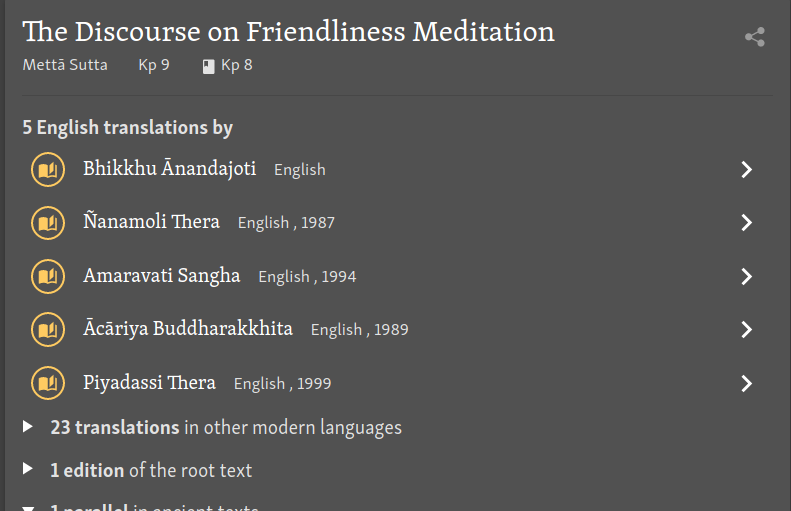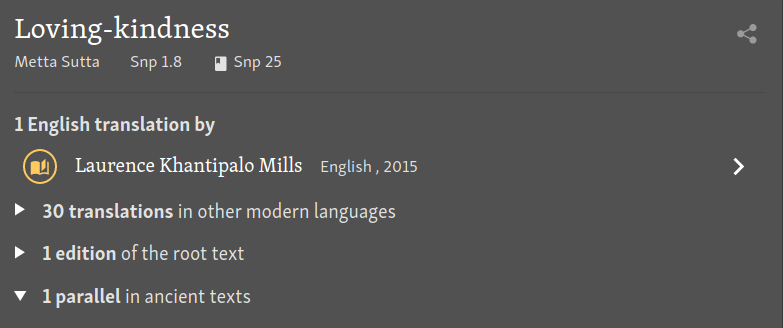Hello, Everyone.
buddham saranam gacchami
dhammam saranam gacchami
sangam saranam gacchami
here, as i think, is an Arabic-language translation of Metta sutta from sutta nipata.
I’ve made it after seeing the already available Metta sutta translation into Arabic, which is also the only Arabic-language translation available on the whole website.
I felt that i was obliged to do this translation after seeing the previous one, which is made in Egyptian-folk slang language, which i see is not suitable to be a language to translate into, nor for sutra, nor for any sacred text. also, i think this slang language cannot be considered “Arabic Language” (beside from using some Arabic nouns and Arabic writing system in it, it is very far from classical or modern arabic). in my view, normal Arab readers will find it hard to read and understand the translation if they are not egyptian.
i can make an example: it’s like if 50 cent or 2pac or Snoop Dogg are using their dictionary and nouns to translate a sutra into English. will the English-speaking masses understand it the same?
here is the translation:
صحيفة حب الخير
ما يجب على امرئٍ أوتي الحكمة أن يعمله لتنزل عليه السّكينة هو هذا:
يجب عليه أن يكون قادراً، قائماً، مستقيماً، بلا فخرٍ، سهل المعشر، لطيفاً، قنوعاً،
سهل الإرضاء، لا ينفعل عند الصخب الشديد، حذراً في التّعامل مع الآخر، هادئ الحواس، ذكيّاً، بلا جُرأة، لا يطمع عندما يكون مع الآخرين،
لا يقوم حتّى بالأشياء الهيّنة الّتي يلومها الحكماء الآخرون. (حاملاً هذه الفكرة دائماً):
"عسى أن تعيش جميع الكائنات بسعادةٍ وأمان،
ولتبتهج قلوبهم من الداخل.
أيّاً من كانوا وتنبض الحياة فيهم
سواءً كانوا ضعفاء أو أقوياءً جدّاً،
بلا استثناء، سواءً كانوا طوالاً أو قصاراً،
أو متوسطي الحجم، أو كباراً أو صغاراً،
أو ذوي كثافةٍ، يُرون أو لا يُرون
سواءً كانوا يسكنون بعيداً أو يسكنون قريباً،
الذين هُم هُنا، الذين يُسعون لأن يدخلوا الوجود –
عسى أن تبتهج جميع الكائنات من الداخل."
لا لأن يجلب أحدٌ لغيره الخراب
ولا يحقرنّه بأيٍّ طريقٍ أو مكان،
لا لأن يتمنى بعضٌ لبعضٍ أي سوءٍ
بسبب الاستفزاز أو بسبب العداوة.
كما أنّ الأم تخاطر بحياتها
لأجل حبّ وحماية ولدها الوحيد،
كما يجب على المرء أن ينمّي هذا الحب الغير محدود
إلى كل من يعيش في كل هذا الكون –
مُمتدّاً من وعيٍ سامٍ
نحو الأعلى ونحو الأسفل وعبر العالم،
من غير انزعاج، مُحرّراً من الكره والعدوان
وعندما يقف المرء وعندما يقعد
أو عندما يستلقي من غير نعاس،
يجب عليه أن يعزم على أن يكون على هذه الحال –
هذا هو الشعور المقدّس الّذي يقولون عنه.
لكن عندما يعيش المرء بعيداً عن الرأي،
متحليّاً بالفضيلة، حاصلاً على البصيرة الكاملة،
مُلقياً وراءه الطمع نحو ما تشتهي الأنفس،
فإنّه يقيناً لن يُولد من جديد.




 But I don’t think that mistake is represented in any of the translations. They have the good version.
But I don’t think that mistake is represented in any of the translations. They have the good version. 